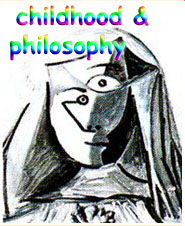intersubjectivity: a look at the community of philosophical inquiry
DOI:
https://doi.org/10.12957/childphilo.2019.42218Keywords:
intersubjectivity, communicative rationality, community of philosophical inquiryAbstract
The intersubjective paradigm advocated by Habermas laid the foundation for a new way of reaching rationally predicated consensus. His work indicates that what keeps people in an attitude of communicative action is rational basis and motivation. Upon analysing the intersubjective dimension of the practice of the community of philosophical inquiry, we realized that it possible to observe the transition from a subject-centred autonomy of treason (thinking for oneself), to the practice of a communicative rationality (focused on thinking in community). The inevitable assumptions of communication ground and sustain communities and allow for an environment of trust and care that enables community members to think freely and let themselves be driven by the power of “we”, “nos-otros”. It is not only in the context of communities of philosophical inquiry that the potential of Habermas’ intersubjective paradigm can be observed, but also in the discussion among specialists. To an extent, this is what we found when we studied the various approaches of Ann Sharp, David Kennedy, and Giuseppe Ferraro to the concept of the community of philosophical inquiry. The dialogue between these philosophers and the concept of the community of philosophical inquiry, their arguments, and the ways of achieving philosophical dialogue in community offer rich evidence of the productiveness of communicative rationality. We are aware that Ann Sharp’s concept of community of philosophical inquiry is different from David Kennedy’s, and that both are distinct from Giuseppe Ferraro’s circle of thinking. Nevertheless, we place these different approaches into dialogue, due largely to what is permitted by the movement of communicative rationality itself. These possibilities for dialogue are also grounded in the assumption of an intersubjective relationship between concepts, experiences and thoughts about concepts and experiences. By understanding the community of philosophical inquiry as a space of intersubjectivity (Sharp, 1987), opening the philosophical community to other non-discursive dimensions of communication (Kennedy, 1994), and analysing the circle of thinking that fills space with time and turns it into a place (Ferraro, 2018), we reveal that the community of philosophical inquiry is an open and fruitful concept and experience: a concept in motion.Downloads
References
COOKE, Maeve. Language and Reason. A Study of Habermas’s Pragmatics. Cambridge: The MIT Press, 1994.
CUNHA, E. KRÜGER, J. LOPES, S. KOHAN, Walter. Por amor à filosofia… e ao mundo que se abre com ela. Revista Digital de Ensino de Filosofia, Santa Maria, v. 1, n.1, p. 80-103, 2015.
FERRARO, G. A escola dos sentimentos. Da alfabetização das emoções à educação afetiva. Rio de Janeiro: NEFI, Coleção Ensaios, 2018.
FLETCHER, N. Shared Autonomous Reasoning: Interpretations of Habermasian Discourse for the Community of Philosophical Inquiry. Revista Analytic teaching and philosophical praxis, v. 37, n. 1, p. 46-62, 2016.
HABERMAS, J. O discurso filosófico da modernidade. Alfragide: Publicações Dom Quixote, 1985.
HABERMAS. J. 1. ‘Rationality’ – A Preliminary Specification. in The Theory of Communicative Action. Reason and the Rationalization of Society. v. 1. Cambrigde: Polity Press, p. 8-42, 1986.
HABERMAS, J. Capítulo III – Notas programáticas para a fundamentação de uma ética do discurso. Ponto 2 – O princípio da universalização como regra de argumentação. in Consciência Moral e Agir Comunicativo. Rio de Janeiro: Tempo Brasileiro (tradução de Guido A. De Almeida), p. 78-131, 1989.
HABERMAS. J. Racionalidade e Comunicação. Lisboa: Biblioteca de filosofia contemporânea, Edições 70, 1996.
HABERMAS, J. Between Naturalism and Religion. Cambridge: Polity Press, 2008.
HABERMAS, J. Capítulo 5. Teorias da verdade. in Teoria da Racionalidade e Teoria da Linguagem, v. II. Lisboa: Edições 70, p. 181-233, 2010.
KENNEDY, D. The Five Communities. Revista Analytic Teaching, v. 15, n. 1, p. 3-15, 1994.
KENNEDY, D. The Philosopher as Teacher. The Role of a Facilitator in a Community of Philosophical Inquiry. Revista Metaphilosophy, v. 35, n. 5, p. 744-765, 2004.
KENNEDY, N. & KENNEDY, D. Community of philosophical inquiry as a discursive structure, and its role in school curriculum design. in N. Vansieleghem and D. Kennedy (eds.), Philosophy for children in transition: Problems and prospects. London: Blackwell, p. 97-116, 2012.
KENNEDY, D. KENNEDY, N. Community of philosophical inquiry online and off: retrospectus and prospectus. in AKYOL, Z.; GARRISON, D. R. A Educational Communties of Inquiry: Theoretical Framework, Research and Practice. Hershey, Pensilvânia: Editora IGI Global, p. 12-29, 2013.
KENNEDY. D. An Archetypal Phenomenology of Skolé. Revista Educactional Theory, v. 67, n. 3, p. 273-290, 2017.
KOHAN, W. Palavras, passos e nomes para um projeto. in W. Kohan and B.F. Olarieta (org.) A escola pública aposta no pensamento. São Paulo: Gutenberg, p. 13-49, 2012.
KOHAN, W. A música da amizade: notas entre filosofia e educação. Revista Educação (UFSM), v. 43, n. 2, p. 27-38, 2018.
LIPMAN, M. Good Thinking. Revista Inquiry: Critical Thinking Across the Disciplines, v. 15, n. 2, p. 37-41, 1995.
LIPMAN, M. Thinking in Community. Revista Inquiry: Critical Thinking Across the Disciplines, v. 16, n. 4, p. 6-21, 1997.
LIPMAN, M. GARCIA MORYIÍN. Matthew Lipman: uma biografia intelectual. Haser Revista Internacional de Filosofía Aplicada, v. 2, p. 177-200, 2011.
LIPMAN, M. Thinking in Education. Cambridge: Cambridge University Press, 2003.
MIRANDA ALONSO, T. Accion Comunicativa Y Processo Educativo: J. Habermas y M. Lipman. Ensayos: Revista de la Facultad de Educación de Albacete, v. 2, p.33-46, 1991.
SHARP, A. What is a community of inquiry? in Journal of Moral Education. v. 16, n. 1, p. 37-45, 1987.
SPLITTER, L. SHARP, A. La outra educación. Filosofia para Ninös y la comunidade de indagación. Buenos Aires: Manantial, 1995.
VANSIELEGHEM, N. KENNEDY, D. What is Philosophy for Children, What is Philosophy with Children – After Matthew Lipman?. In Journal of Philosophy of Education, v. 45, n.2, p. 172-182, 2011.
WEBER, B. J. Habermas and the Art of Dialogue: The Practicability of the Ideal Speach Situation. in Analytic Teaching, v. 28, n. 1, 2008. Disponível em: http://libservices.viterbo.edu/journal/ojs/index.php/at/article/view/856. Acesso em: 3 out. 2017.




